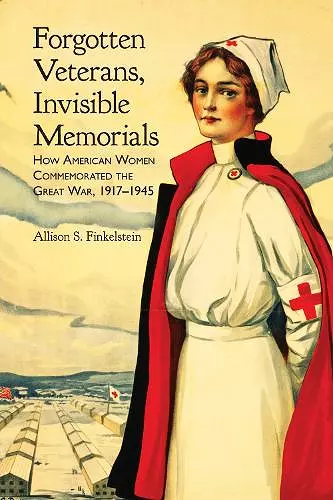Forgotten Veterans, Invisible Memorials
How American Women Commemorated the Great War, 1917-1945
Format:Paperback
Publisher:The University of Alabama Press
Published:30th Sep '23
Should be back in stock very soon

Investigates the groundbreaking role American women played in commemorating those who served and sacrificed in World War I.
In Forgotten Veterans, Invisible Memorials: How American Women Commemorated the Great War, 1917-1945 Allison S. Finkelstein argues that American women activists considered their own community service and veteran advocacy to be forms of commemoration just as significant and effective as other, more traditional forms of commemoration such as memorials. Finkelstein employs the term “veteranism” to describe these women’s overarching philosophy that supporting, aiding, and caring for those who served needed to be a chief concern of American citizens, civic groups, and the government in the war’s aftermath. However, these women did not express their views solely through their support for veterans of a military service narrowly defined as a group predominantly composed of men and just a few women. Rather, they defined anyone who served or sacrificed during the war, including women like themselves, as veterans.
These women veteranists believed that memorialization projects that centered on the people who served and sacrificed was the most appropriate type of postwar commemoration. They passionately advocated for memorials that could help living veterans and the families of deceased service members at a time when postwar monument construction surged at home and abroad. Finkelstein argues that by rejecting or adapting traditional monuments or by embracing aspects of the living memorial building movement, female veteranists placed the plight of all veterans at the center of their commemoration efforts. Their projects included diverse acts of service and advocacy on behalf of people they considered veterans and their families as they pushed to infuse American memorial traditions with their philosophy. In doing so, these women pioneered a relatively new form of commemoration that impacted American practices of remembrance, encouraging Americans to rethink their approach and provided new definitions of what constitutes a memorial. In the process, they shifted the course of American practices, even though their memorialization methods did not achieve the widespread acceptance they had hoped it would.
Meticulously researched, Forgotten Veterans, Invisible Memorials utilizes little-studied sources and reinterprets more familiar ones. In addition to the words and records of the women themselves, Finkelstein analyzes cultural landscapes and ephemeral projects to reconstruct the evidence of their influence....
Finkelstein’s book is an engaging history of the creative ways women sought to publicize their war work and their postwar challenges, and she does a good job of explaining who had access to these societies and who did not." - Journal of Military History
"Allison Finkelstein’s book expands our knowledge of the women who served the nation in a time of war, and who wanted their work to be remembered. She recovers not just the work they did, but their attempts to commemorate it in ways that honored and ‘paid forward’ their commitments to serving others. They did this, as she shows, not just by erecting monuments, but by forming ‘living memorials’ such as buildings and schools but also less tangible things such as advocacy work and providing financial support. These “veteranists” worked to make the public see women not just as war-time volunteers but as veterans, in their own right, even though many of them had worked in non-official and non-governmental capacities." - Pearl James, author The New Death: American Modernism and World War I and editor of Picture This! World War I Posters and Visual Culture
"Forgotten Veterans, Invisible Memorials not only adds to the study of American memory of the war by including service to others as a form of remembrance, but by shedding light on the ways women sought full recognition for their service as veterans on par with that accorded to men." - Kimberly J. Lamay Licursi, author of Remembering World War I in America
"This book importantly shifts the lens of analysis from men to women’s experiences of the First World War for a different perspective of memorialization. The author challenges readers, also, to expand their definition of the term ‘veteran’ to include all people—including women and civilians—who were voluntarily or involuntarily affected by the war. She importantly identifies that veteranist memorializations were intangible, significant in impact but short-lived in cultural memory, contributing to their historical silence.… [Finkelstein] presents an innovative framework for reevaluating the political nature and legacy of American women’s wartime contributions." - H-Net Reviews
ISBN: 9780817361211
Dimensions: unknown
Weight: 272g
284 pages